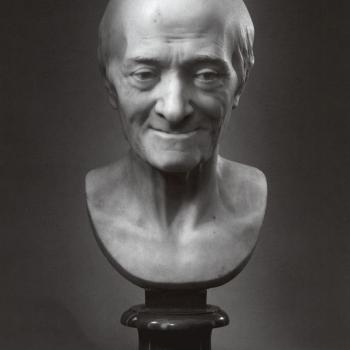![671[1]](http://wp.production.patheos.com/blogs/freelancechristianity/files/2013/09/6711.gif?w=150) Although not much of an athlete, I’m a big sports fan. Actually, that’s a serious understatement—I’m a rabid sports fan, especially of pro baseball (Boston Red Sox) and college basketball (Providence College Friars).
Although not much of an athlete, I’m a big sports fan. Actually, that’s a serious understatement—I’m a rabid sports fan, especially of pro baseball (Boston Red Sox) and college basketball (Providence College Friars).![Primary-friars-rgb-250[1]](http://wp.production.patheos.com/blogs/freelancechristianity/files/2013/09/primary-friars-rgb-2501.gif?w=150) These are passions that go beyond rational explanation, especially in my line of work. My colleagues, if they care at all, probably file my fanaticism about the Red Sox and the Friars in the “there goes Morgan again” file. Over the past several years, the problem of steroid use has frequently threatened to tarnish the reputation of pro baseball; every time it seems to die down, yet another superstar admits, usually under duress, to having used banned substances in the recent past. In the face of what appears to be solid evidence, however, some accused players steadfastly refuse to admit such use. A few years ago, for instance, Roger Clemens, whose Hall-of-Fame-certain pitching career has been darkened by the cloud of steroid use allegations, was asked how he responded to the testimony of a former teammate who stated under oath that he observed Clemens being injected with a banned substance on several occasions. That teammate,
These are passions that go beyond rational explanation, especially in my line of work. My colleagues, if they care at all, probably file my fanaticism about the Red Sox and the Friars in the “there goes Morgan again” file. Over the past several years, the problem of steroid use has frequently threatened to tarnish the reputation of pro baseball; every time it seems to die down, yet another superstar admits, usually under duress, to having used banned substances in the recent past. In the face of what appears to be solid evidence, however, some accused players steadfastly refuse to admit such use. A few years ago, for instance, Roger Clemens, whose Hall-of-Fame-certain pitching career has been darkened by the cloud of steroid use allegations, was asked how he responded to the testimony of a former teammate who stated under oath that he observed Clemens being injected with a banned substance on several occasions. That teammate,  Clemens answered, had “misremembered.”
Clemens answered, had “misremembered.”
Memory is tricky, an often unreliable something out of which, for better or for worse, we construct our past, interpret our present, and envision our future. I’ve been thinking about memory recently, as my colleagues and I introduce freshmen to the literature of the ancient world in the interdisciplinary program I direct and teach in. The notion of oral tradition is completely foreign to contemporary eighteen-year-olds, as is the idea of extensive memorization being what made the transmission of such traditions from generation to generation possible. ![storytelling[1]](https://wp-media.patheos.com/blogs/sites/766/2013/09/storytelling1.jpg?w=300) Ancient people possessed remarkable memorization abilities which atrophied with the advent of writing. I’ve observed my own memory erode over the years simply because of new technology that made memorization unnecessary. I used to easily hold several dozen ten-digit telephone numbers in my memory, even remembering my childhood home phone numbers and those of my girlfriends when I was in high school. Now I know my cell number and two office numbers, can remember Jeanne’s cell number if I think for a second, but have no other phone numbers available in my memory files. Why? Because all I need to do is tap my cell phone two or three times and I can find any one of the hundreds of numbers stored in it. The part of my brain that used to do that can now do something else (or atrophy).
Ancient people possessed remarkable memorization abilities which atrophied with the advent of writing. I’ve observed my own memory erode over the years simply because of new technology that made memorization unnecessary. I used to easily hold several dozen ten-digit telephone numbers in my memory, even remembering my childhood home phone numbers and those of my girlfriends when I was in high school. Now I know my cell number and two office numbers, can remember Jeanne’s cell number if I think for a second, but have no other phone numbers available in my memory files. Why? Because all I need to do is tap my cell phone two or three times and I can find any one of the hundreds of numbers stored in it. The part of my brain that used to do that can now do something else (or atrophy).
![Bible Memorization[1]](http://wp.production.patheos.com/blogs/freelancechristianity/files/2013/09/bible-memorization1.jpg) But some things are unforgettable. My memory in my youth was developed both by my piano training and by forced Bible memorization. Although I’ve not made a study of it, I’ll bet that memorizing music and memorizing the written word involve two different parts of the brain, because I was always much better at memorizing Bible verses than passages from Mozart, Bach, or Debussy. Of the Old Testament verses I was required to memorize, the majority of them were from the Psalms, passages that remain some of my favorites from Scripture. Psalm 23, of course, but also Psalm 91 (“He who dwells in the secret place of the most High”), Psalm 103 (“Bless the Lord, O my soul”—
But some things are unforgettable. My memory in my youth was developed both by my piano training and by forced Bible memorization. Although I’ve not made a study of it, I’ll bet that memorizing music and memorizing the written word involve two different parts of the brain, because I was always much better at memorizing Bible verses than passages from Mozart, Bach, or Debussy. Of the Old Testament verses I was required to memorize, the majority of them were from the Psalms, passages that remain some of my favorites from Scripture. Psalm 23, of course, but also Psalm 91 (“He who dwells in the secret place of the most High”), Psalm 103 (“Bless the Lord, O my soul”—![I_Will_Lift_Up_M_4b73106922b8d[1]](https://wp-media.patheos.com/blogs/sites/766/2013/09/i_will_lift_up_m_4b73106922b8d1.jpg?w=300) a text that is forever set in my memory to the music from Godspell), Psalm 121 (“ I will lift up mine eyes unto the hills”) and many others stayed with me as welcome companions even after I sought to walk away from my heritage in my young adulthood. In class the other day, I enjoyed reciting two or three Psalms to freshmen (it was Old Testament week) as some of them followed along in their texts to track the difference between the NRSV and King James translations. Those who were not following along stared at me as if I were some sort of pony-tail-wearing mutant or trained monkey.
a text that is forever set in my memory to the music from Godspell), Psalm 121 (“ I will lift up mine eyes unto the hills”) and many others stayed with me as welcome companions even after I sought to walk away from my heritage in my young adulthood. In class the other day, I enjoyed reciting two or three Psalms to freshmen (it was Old Testament week) as some of them followed along in their texts to track the difference between the NRSV and King James translations. Those who were not following along stared at me as if I were some sort of pony-tail-wearing mutant or trained monkey.
Of all the Psalms from my youth, Psalm 19 was and still remains my favorite.
The heavens declare the glory of God;
![Tangalooma%20Sunset[1]](https://wp-media.patheos.com/blogs/sites/766/2013/09/tangalooma20sunset1.jpg?w=300) And the firmament showeth His handiwork.
And the firmament showeth His handiwork.
Day unto day uttereth speech,
And night unto night showeth knowledge.
There is no speech nor language
Where their voice is not heard.
Their sound is gone out into all lands,
And their words unto the end of the world.
Even in the stilted and outdated language of the King James Version (I wasn’t sure what a “firmament” was, nor were “showeth” or “uttereth” verbs my people used often), I recognized it as beautiful poetry as a mere child. And it was one of the pillars (along with passages from Romans 1 and 10) of my church’s answer to the question “Are those who haven’t heard about Jesus going to hell?” The thought that they would always seemed unfair to me, but in Romans Paul insists, as does the writer of Psalm 19, that God’s presence and truth is there for the observing for those who care to pay attention; Paul says that those who do not “are without excuse.”
So it was disconcerting to find out while on sabbatical that I had “misremembered” Psalm 19. My first clue was when Psalm 19 was up to the plate one day during noon prayer (all of the Psalms get a turn at bat during the four-week cycle of the hourly office the Benedictines use). We read, in the Grail translation,
The heavens declare the glory of God
![Copyrighted_Image_Reuse_Prohibited_745585[1]](https://wp-media.patheos.com/blogs/sites/766/2013/09/copyrighted_image_reuse_prohibited_7455851.jpg?w=300) and the firmament shows forth the work of God’s hands.
and the firmament shows forth the work of God’s hands.
Day unto day takes up the story
and night unto night makes known the message.
No speech, no word, no voice is heard
yet their span extends through all the earth,
their words to the utmost bounds of the world.
As usual, reading a Psalm that I memorized in the King James Version in another translation was weird, as if someone had messed with the text of a Christmas carol or something. My curiosity was piqued as I compared “No speech, no word, no voice is heard” with the “There is no speech or language where their voice is not heard” of my memory. I try not to be a philosopher at noon prayer, but I didn’t have to be a philosopher to realize that these comparative lines had exactly opposite meanings. Either what the heavens and the firmament have to say is heard in all languages or it is not heard in any voice or language at all. When I got back to my apartment, ![115042273[1]](https://wp-media.patheos.com/blogs/sites/766/2013/09/1150422731.jpg?w=300) I checked my KJV and read “there is no speech or language; their voice is not heard.” I had misremembered—I had replaced a semicolon with a “where.” My memorized “there is no speech or language where their voice is not heard” had exactly reversed what Psalm 19:3 is saying. And another small piece of my past—this time my favorite Psalm—bites the dust.
I checked my KJV and read “there is no speech or language; their voice is not heard.” I had misremembered—I had replaced a semicolon with a “where.” My memorized “there is no speech or language where their voice is not heard” had exactly reversed what Psalm 19:3 is saying. And another small piece of my past—this time my favorite Psalm—bites the dust.
Our core selves are essentially created out of our memories—the philosopher John Locke,![JohnLocke[1]](https://wp-media.patheos.com/blogs/sites/766/2013/09/johnlocke1.png?w=116) one of the pioneers of investigation into personal identity, once wrote that “one’s personal identity extends only so far as one’s memories.” But what happens when my memories are faulty? I recall how jarring it was when I was a teenager to learn that a picture in my baby book (Facebook was not even a glimmer in anyone’s imagination in those days) of me looking angelically at a candle flame taken when I was a year or two old was actually a picture of my brother (my grandmother spilled the beans). That picture had become a part of my identity, and grandmaw ripped it away. How many other cornerstones of my identity, constructed out of my memories, are inaccurate or figments of my imagination? I feel an existential crisis coming on.
one of the pioneers of investigation into personal identity, once wrote that “one’s personal identity extends only so far as one’s memories.” But what happens when my memories are faulty? I recall how jarring it was when I was a teenager to learn that a picture in my baby book (Facebook was not even a glimmer in anyone’s imagination in those days) of me looking angelically at a candle flame taken when I was a year or two old was actually a picture of my brother (my grandmother spilled the beans). That picture had become a part of my identity, and grandmaw ripped it away. How many other cornerstones of my identity, constructed out of my memories, are inaccurate or figments of my imagination? I feel an existential crisis coming on.
![PI1-1[1]](https://wp-media.patheos.com/blogs/sites/766/2013/09/pi1-11.jpg?w=150) But perhaps the accuracy of my remembered history is far less important than the need for me to embrace it as mine. I’ve spent a long time over the years trying to delete corrupted files; now I want to spend just as much time inserting them into my present as core parts of my past projected into my future. Because “day unto day takes up the story” doesn’t just apply to the heavens and the firmament—it applies to me.
But perhaps the accuracy of my remembered history is far less important than the need for me to embrace it as mine. I’ve spent a long time over the years trying to delete corrupted files; now I want to spend just as much time inserting them into my present as core parts of my past projected into my future. Because “day unto day takes up the story” doesn’t just apply to the heavens and the firmament—it applies to me.
















